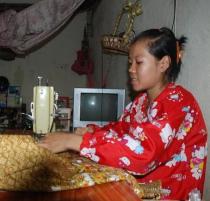Ven. Bhikkhu Bodhi
This is the first of a four-part series of posts giving brief summaries of the BGR projects approved for fiscal year 2013–14. Thanks are due to Patti Price, chair of the Projects Committee, and Jessie Benjamin, Carla Prater, Jennifer Russ, and Khanh Nguyen who all helped to prepare the material used in this series. Projects are arranged alphabetically by country, with the U.S. projects to follow the international projects.
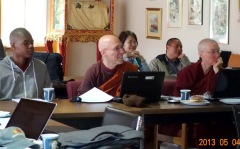 Over the first weekend of May, months of hard work by BGR team members came to fruition at the annual general meeting and projects selection board meeting, both held in the Woo Ju Memorial Library at Chuang Yen Monastery, Carmel, New York. The general meeting, on Saturday, May 4, was attended by team members from as far away as California, Colorado, Illinois, and Texas. At the board meeting on Sunday, May 5th, the board considered a slew of applications for partnership grants. Twenty-one projects were approved for the next fiscal year, at a total cost of $285,000. The projects are both international and domestic in scope. They include renewals of existing projects and a substantial number of new undertakings with partners both new and old. Their fields range from Cambodia and Vietnam, through India, Sri Lanka, Rwanda, Ethiopia, and Cote d’Ivoire, to Haiti, New York, and California. Distinctive about this year’s register is the number of multiyear projects that are to be launched. Experience has taught us that projects extending over several years provide a better timeframe for accomplishing more ambitious objectives than is possible with a one-year project, our usual mode of operation. Here are brief summaries of the projects approved for implementation.
Over the first weekend of May, months of hard work by BGR team members came to fruition at the annual general meeting and projects selection board meeting, both held in the Woo Ju Memorial Library at Chuang Yen Monastery, Carmel, New York. The general meeting, on Saturday, May 4, was attended by team members from as far away as California, Colorado, Illinois, and Texas. At the board meeting on Sunday, May 5th, the board considered a slew of applications for partnership grants. Twenty-one projects were approved for the next fiscal year, at a total cost of $285,000. The projects are both international and domestic in scope. They include renewals of existing projects and a substantial number of new undertakings with partners both new and old. Their fields range from Cambodia and Vietnam, through India, Sri Lanka, Rwanda, Ethiopia, and Cote d’Ivoire, to Haiti, New York, and California. Distinctive about this year’s register is the number of multiyear projects that are to be launched. Experience has taught us that projects extending over several years provide a better timeframe for accomplishing more ambitious objectives than is possible with a one-year project, our usual mode of operation. Here are brief summaries of the projects approved for implementation.
1. Bangladesh: Making Markets Work for Women NEW
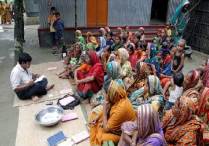 Helen Keller International, established in 1915, works in 22 countries to save the sight and lives of the most vulnerable and disadvantaged through programs in vision, health, and nutrition. BGR will be partnering with HKI on a three-year program in Bangladesh called “Making Markets Work for Women.” The program aims to uplift 75 extremely poor indigenous households in five villages in the Chittagong Hill Tracts (CHT), one of the poorest regions in the country. The project will train women in agricultural skills such as pest management, organic fertilizer use, and intercropping, as well as food processing techniques. It will also establish community marketing groups for women so participants can work together to process and sell their products, thus helping to combat discrimination at local markets. Courtyard sessions will focus on gender and nutrition issues relevant to both men and women, including optimal feeding practices for children from birth to two years of age. Year one of a three-year project.
Helen Keller International, established in 1915, works in 22 countries to save the sight and lives of the most vulnerable and disadvantaged through programs in vision, health, and nutrition. BGR will be partnering with HKI on a three-year program in Bangladesh called “Making Markets Work for Women.” The program aims to uplift 75 extremely poor indigenous households in five villages in the Chittagong Hill Tracts (CHT), one of the poorest regions in the country. The project will train women in agricultural skills such as pest management, organic fertilizer use, and intercropping, as well as food processing techniques. It will also establish community marketing groups for women so participants can work together to process and sell their products, thus helping to combat discrimination at local markets. Courtyard sessions will focus on gender and nutrition issues relevant to both men and women, including optimal feeding practices for children from birth to two years of age. Year one of a three-year project.
2. Bangladesh: Educating Children in
the Chittagong Hill Tracts NEW
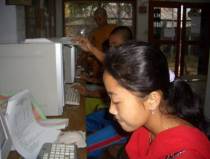 Moanoghar was founded in 1974 by a group of Buddhist monks to provide shelter to children of the Chittagong Hill Tracts affected by conflict or living in remote areas. There are currently more than 1,250 children sheltered at Moanoghar, approximately 40% of them girls. Many of the children were left homeless or orphaned as the result of a decades-long ethnic conflict. All children at Moanoghar receive free or highly subsidized education. BGR will be sponsoring a three-year project to establish a sustainable educational system that can generate income to support the institution and support the children being schooled there. The program has three components: (1) to build a computer lab to teach the children IT; (2) to provide stipends for the children for general and technical education; and (3) to plant trees and bamboo orchards that will provide economic returns to Moanoghar. Year one of a three-year project.
Moanoghar was founded in 1974 by a group of Buddhist monks to provide shelter to children of the Chittagong Hill Tracts affected by conflict or living in remote areas. There are currently more than 1,250 children sheltered at Moanoghar, approximately 40% of them girls. Many of the children were left homeless or orphaned as the result of a decades-long ethnic conflict. All children at Moanoghar receive free or highly subsidized education. BGR will be sponsoring a three-year project to establish a sustainable educational system that can generate income to support the institution and support the children being schooled there. The program has three components: (1) to build a computer lab to teach the children IT; (2) to provide stipends for the children for general and technical education; and (3) to plant trees and bamboo orchards that will provide economic returns to Moanoghar. Year one of a three-year project.
3. Cambodia: System of Rice Intensification
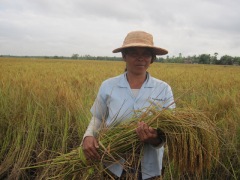 Rachana is a Cambodian organization dedicated to improving the socio-economic well-being of poor and vulnerable communities in Cambodia. Rachana has been promoting the System of Rice Intensification (SRI), an ecologically sensitive agricultural methodology that increases yields of rice from an average of 2 tons per hectare to 4.75 tons per hectare. BGR has already partnered with Rachana over the past two years in spreading the use of SRI, with highly favorable results. The program has enabled farmers to feed their own families better and obtain a surplus to sell on the market. As a result, SRI has substantially boosted family incomes. The annually renewable program will promote SRI in eight villages, five old ones and three new ones, up to December 2013.
Rachana is a Cambodian organization dedicated to improving the socio-economic well-being of poor and vulnerable communities in Cambodia. Rachana has been promoting the System of Rice Intensification (SRI), an ecologically sensitive agricultural methodology that increases yields of rice from an average of 2 tons per hectare to 4.75 tons per hectare. BGR has already partnered with Rachana over the past two years in spreading the use of SRI, with highly favorable results. The program has enabled farmers to feed their own families better and obtain a surplus to sell on the market. As a result, SRI has substantially boosted family incomes. The annually renewable program will promote SRI in eight villages, five old ones and three new ones, up to December 2013.
4. Cambodia: Giving Girls Access to Education
 Since 2009, BGR has been partnering with U.S.-based Lotus Outreach International in support of its life-transforming Girls Access To Education (GATE) program, intended to ensure that girls remain in school. In Cambodia the education of girls is considered unnecessary, but LOI and BGR are trying to promote a new perspective. To encourage families to keep their girls in school, Lotus Outreach provides 50 kg of rice monthly during the school year to the families of 50 poor girls in Siem Reap and Banteay Meanchey. Without such assistance these highly vulnerable girls would almost surely be forced to leave school for work; many would wind up in brothels. With support from BGR, Lotus Outreach has recently been extending rice support to GATE graduates who enroll in university programs. These graduates, who have risen up from poverty to enter university, are called GATEways scholars. The grant from BGR will enable 33 additional GATEways scholars to receive 15 kilograms of rice for each month they attend classes during the year or live away from home due to their individual circumstances. With continued scholarship support, we hope to see these young women rank among the exclusive 1% of Cambodia’s female population to receive post-secondary education. An annually renewable program.
Since 2009, BGR has been partnering with U.S.-based Lotus Outreach International in support of its life-transforming Girls Access To Education (GATE) program, intended to ensure that girls remain in school. In Cambodia the education of girls is considered unnecessary, but LOI and BGR are trying to promote a new perspective. To encourage families to keep their girls in school, Lotus Outreach provides 50 kg of rice monthly during the school year to the families of 50 poor girls in Siem Reap and Banteay Meanchey. Without such assistance these highly vulnerable girls would almost surely be forced to leave school for work; many would wind up in brothels. With support from BGR, Lotus Outreach has recently been extending rice support to GATE graduates who enroll in university programs. These graduates, who have risen up from poverty to enter university, are called GATEways scholars. The grant from BGR will enable 33 additional GATEways scholars to receive 15 kilograms of rice for each month they attend classes during the year or live away from home due to their individual circumstances. With continued scholarship support, we hope to see these young women rank among the exclusive 1% of Cambodia’s female population to receive post-secondary education. An annually renewable program.
5. Cambodia: Helping Women Escape the Sex Trade
Driven by desperate poverty, with no other opportunities in sight, many girls in Cambodia find themselves compelled to turn to the sex trade to support themselves and their families. Lotus Outreach’s Non-Formal Education program offers these women and their children a light in the dark. By teaching them basic literacy, health education, life skills, and vocational training, the program helps young women escape exploitation while discovering their own strength, self-worth, and competency. The renewed grant from BGR will provide non-formal education, vocational training, and life skills to approximately 30 sex workers and their children. Daughters of sex workers receive scholarship packages so they can return to school. Many of these women and children will learn to read and write for the first time in their lives. An annually renewable program.
6. Côte d’Ivoire: Enhanced Homestead Food Production NEW
 BGR will be partnering with Helen Keller International on a three-year expansion of its innovative Enhanced Homestead Food Production program in Côte d’Ivoire’s Bouaké District (Gbèkè Region), an especially poor district where families struggle with food security and lack access to food markets. The project is designed to improve the food security and nutritional status of vulnerable households, with special emphasis on women and young children. A model of enhanced food production through the establishment of year-round gardens and farms will be taught to community gardening groups comprised mostly of women. A key component of the program is growing orange-fleshed sweet potatoes, a food rich in micronutrients especially good for children and pregnant women. The project will improve gardening practices, irrigation systems, and income generation, while empowering women. Farmers will also learn marketing strategies for selling their crops. Successful small-scale irrigation systems will be of use not only to programs in Côte d’Ivoire but throughout the region, especially to areas vulnerable to climate change. Year one of a three-year program.
BGR will be partnering with Helen Keller International on a three-year expansion of its innovative Enhanced Homestead Food Production program in Côte d’Ivoire’s Bouaké District (Gbèkè Region), an especially poor district where families struggle with food security and lack access to food markets. The project is designed to improve the food security and nutritional status of vulnerable households, with special emphasis on women and young children. A model of enhanced food production through the establishment of year-round gardens and farms will be taught to community gardening groups comprised mostly of women. A key component of the program is growing orange-fleshed sweet potatoes, a food rich in micronutrients especially good for children and pregnant women. The project will improve gardening practices, irrigation systems, and income generation, while empowering women. Farmers will also learn marketing strategies for selling their crops. Successful small-scale irrigation systems will be of use not only to programs in Côte d’Ivoire but throughout the region, especially to areas vulnerable to climate change. Year one of a three-year program.
To be continued

